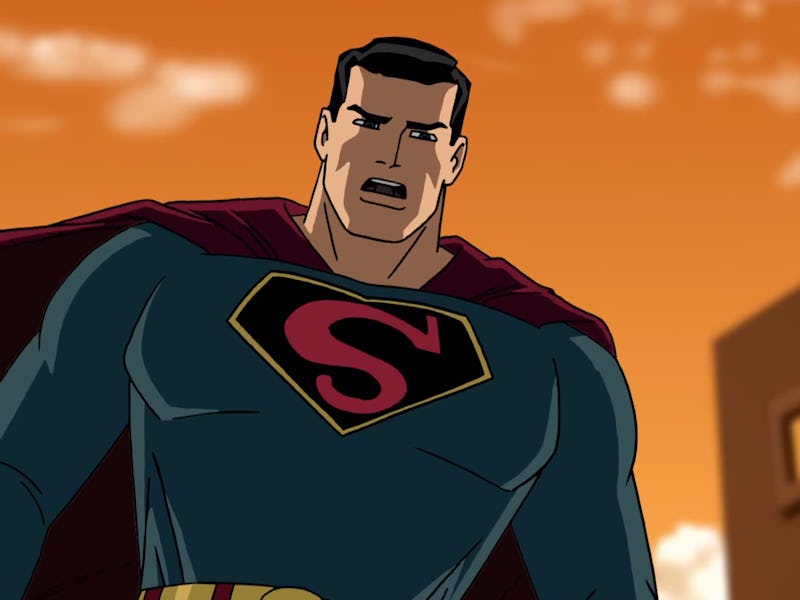James Gunn needs to give the DC Universe a retro reboot
DC can cement its future by looking to the past.

There’s a crisis in the DC Universe even The Flash can’t outrun. But there might be a way for DC to solve its woes, and it means going back to the very beginning.
DC fans worry the sky is falling, following a December 7 bombshell by The Hollywood Reporter. In short, the “DC Extended Universe” is potentially headed to a seismic reset where the remnants of the DCEU will play out before yielding to a rebooted, more unified franchise under James Gunn and Peter Safran.
The buzziest takeaways is that Patty Jenkins’ third Wonder Woman film is a goner; a sequel to Man of Steel with Henry Cavill, who returned as Superman in Black Adam, is close to getting iced once again; and speaking of Black Adam, its mediocre box office means a sequel will not come to pass despite insistence to the contrary by Dwayne Johnson. The next four DC movies that await release dates, Aquaman and the Lost Kingdom, Shazam! Fury of the Gods, The Flash, and Blue Beetle, are all the DCEU’s last hurrah.
There’s a million and one reasons why the “DCEU” (which even now isn’t its official name) hasn’t been in shape to rival the Marvel Cinematic Universe. While the specifics of these movies vastly differ, mainstream audiences still see the same broad strokes of heroic, powerful beings stopping epic threats in the same modern settings — period pieces like Marvel’s Captain America: The First Avenger and DC’s two Wonder Woman films notwithstanding.
But as the DC Universe is on the cusp of a reset, it’s in its best interests to ensure it is distinct from Marvel. There’s one way DC can start over, carve its identity, and still offer something rarely seen in an over-stuffed marketplace: a shared universe that’s actually set in the 1940s.
During the Golden Age of comics in the 1950s, George Reeves brought Superman to life on the screen. Could a modernized version of DC’s Golden Age be the key for a successful reboot?
The Case for a DC “Golden Age”
This isn’t a completely new idea. Electric Playground’s Victor Lucas proposes a similar idea on Twitter, and DC itself has revisited its Golden Age settings in the modern day many times.
But to stand firm against its rivals in Hollywood, DC can and should carve out a universe built on appealing retro-aesthetics, timeless sensibilities, and DC’s own heritage. Superman wasn’t the first comic book published by DC. But his landmark debut in Action Comics #1 in 1938 has shaped superhero popular culture as we know it. A new DCU that actually takes place in the same period could feasibly begin a more cohesive DC Universe that isn’t plagued by backwards continuity, conflicting themes, and an inconsistent canon.
Starting with Superman is how DC Comics, as a publisher, naturally found its way to other major hitters like Batman, Wonder Woman, Shazam/Captain Marvel, the Justice Society, and beyond. While the DCEU also started with Superman via 2013’s Man of Steel, writer/director Zack Snyder’s desire to direct some adaptation of Frank Miller’s The Dark Knight Returns with 2016’s Batman v Superman placed the DCEU on a bizarre trajectory that squeezed what should have been monumental moments in a long-running saga into clunky, unwieldy crossover outings.
In 2008, DC produced the animated feature film Justice League: The New Frontier, an adaptation of Darwyn Cooke’s acclaimed graphic novel that takes place in the early 1950s. A live-action, big screen version of New Frontier could be a way for DC to reorient audiences to a new universe.
This theoretical “New DC” doesn’t have to be “old fashioned” either. As the best contemporary comics ever published by DC — like the late Darwyn Cooke’s celebrated graphic novel DC: The New Frontier or the more setting-ambiguous Justice by Alex Ross, Jim Krueger and Doug Braithwaite — have proved, superheroes are capable as any other genre of ruminating on modernity in period dressing. Besides, a historic economic downturn and America on the verge of facing fascism in and outside its borders is by no means irrelevant in this second decade of the 21st century.
Merely forcing all of DC’s future media into early or mid-century period pieces will not help DC survive the endurance race that is the modern superhero industrial complex. The novelty will wear off by the sequel, and audiences who already feel DC’s characters are too old fashioned probably won’t want to spend a night out at the movies. And any shared universe is subject to the hundreds of talents and artists involved in contributing to a quality product. As the Dark Universe proved years ago, one bad movie can stop a train before it leaves the station.
But DC has a second chance of making a first impression. Whatever impression it chooses, it has to be unforgettable, just like when Superman first landed in our imaginations.
This article was originally published on